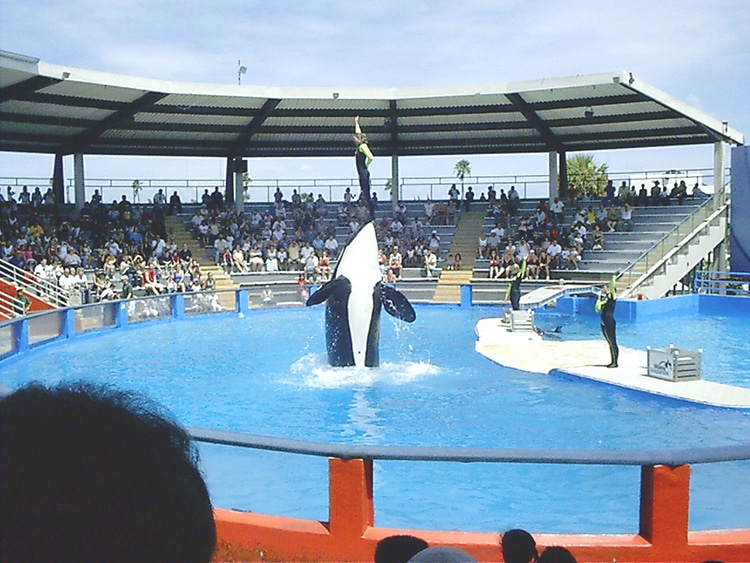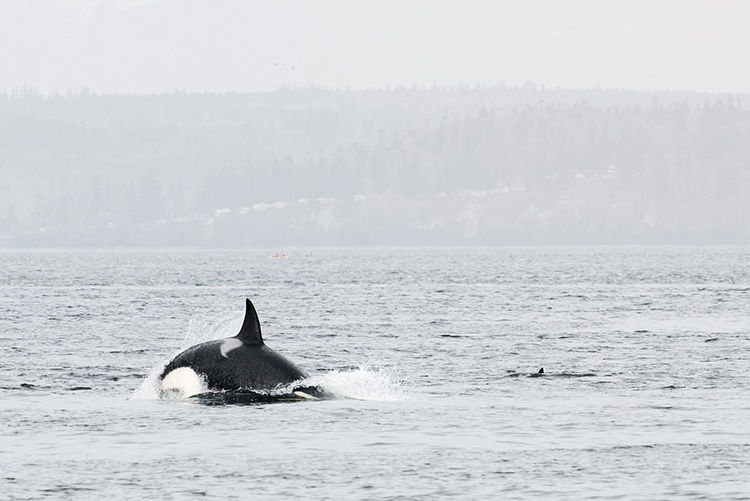
Lolita the orca whale performing at the Miami Seaquarium in 2006. (Photo: Averette via Wikimedia Commons, CC BY 3.0)
If you visited a big aquarium such as SeaWorld or the Miami Seaquarium a decade ago, performances by orcas, also known as killer whales, were probably a centerpiece of the visiting experience. However, animal advocates, Indigenous activists, and others have pushed to end the harmful practice of keeping these enormous whales locked up in small pools, forced to perform for audiences. Now good news emerges in this continuing crusade. Lolita, the resident geriatric orca of the Miami Seaquarium, may soon be released to the Salish Sea where her mother still roams.
Lolita’s possible homecoming is a longtime coming. The enormous mammal was captured in 1970 in the Salish Sea, a body of water off the coast of Washington which is home to pods of killer whales. Captured at age 4, she has spent the past 52 years in captivity in Miami. Her tank is considered the smallest among those of captive orcas in the U.S. She has been forced to perform for crowds for decades. This, according to a recent report by the USDA, has resulted in injuries. She has hit her head while performing “fast swims,” and her bloodwork has been abnormal.
Whales in captivity can suffer severe health effects. Lolita, who is also known as Tokitae or Toki, outlived her tank-mate Hugo. He passed from hitting his head on the aquariums walls, causing an aneurism. “She’s a miracle every day,” Howard Garrett, a whale researcher and activist with Orca Network, told The Guardian. “It’s against all odds that she is still alive. I think it’s about her mental health that keeps her physical health in good shape. She’s not withdrawn, neurotic, not the stereotypic behavior that indicates any kind of brain damage associated with being in captivity. She may be a complete outlier in her ability to stay healthy.”
The USDA also reported that Lolita may not be getting enough food and water. This only adds to the list of health concerns which can appear in captivity. Due to a change in ownership, the chances for her release are now much brighter. Activists who have been pushing for decades may at last see Lolita return to the Salish Sea, where her mother, a 93-year-old orca known as L25 or “Ocean Sun,” leads a pod. Returning these magnificent creatures to their natural habitat is a humane solution advocated for by the likes of The International Marine Mammal Project. It is also important to recognize the connection of Indigenous peoples to the orcas and to work to restore what was taken.
Lolita, also known as Tokitae or Toki, is a geriatric orca whale who has long been kept and forced to perform at the Miami Seaquarium.
View this post on Instagram
Thanks to activists and reports by the USDA, Lolita may soon be released back into the Salish Sea where her mother still roams.

An orca in the Puget Sound, off the coast of Washington. (Photo: CAVAN/Depositphotos)
h/t: [People]
Related Articles:
Photographer Creates Dreamy Escapism With Stunning Stitched Images of Orcas and Sunsets
Rare All-White Orca Whales Spotted in Pacific Ocean
Award-Winning Photographers Share Their Love of Big Animals in Coffee Table Book
Killer Whale Mother Who Mourned Her Dead Calf Gives Birth to a Live and Healthy Calf
